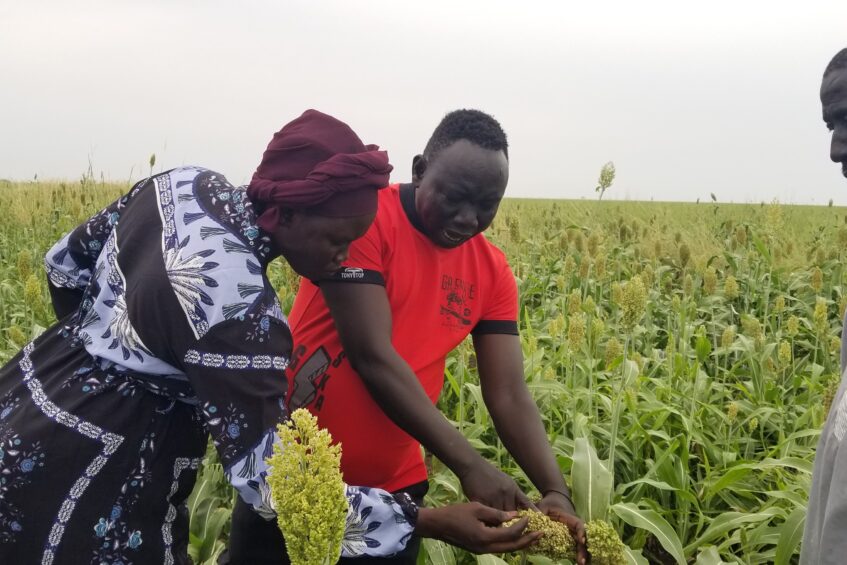You are here: Home | Economy | Governance | News | Helpless Renk farmer feels neglected as birds, locusts destroy farm

Farmer Giil Kuot shows to extension worker eaten sorghum stalk
A farmer in Renk County, Upper Nile State, has expressed worries over the possibility of a poor harvest this season due to infestation by locusts and birds.
Giil Kuot owns 120 hectares of Sorghum in Gerbana Boma of Gerger Payam.
The 32-year-old farmer says a group of quelea birds, also known as red-beaked weaver, storm his sorghum farm early in the morning and evening hours, eating the grains.
Quelea Quelea birds is small in size and is approximately 4.7 inches long and weighing 15–26 migratory, sparrow-like bird of the weaver family native to Sub-Saharan Africa.
Kuot says this is followed by locus who are invading his farm at approximately the same time.
Speaking to Eye Radio in Renk, Kuot blame the state and national government for doing nothing to address the impact of locust and birds in the area.
“Locusts and birds are the biggest challenge here since the time of Sudan, that was the last time farmlands were sprayed with pesticide and there is no assistance or intervention from the government unless you do it by your own.
“… this issue is the work and responsibility of the government especially the Ministry of Agriculture but there is no one looking into it.”
Responding to the concern, the acting Director of County agriculture Department in Renk confirmed the presence of locust and the birds’ destroying grains in the area.
Sabeel Angok however appealed to the farmers to be patient saying the government and partners are working to address the matter.
“So, I urge the farmers to be patient as the organization is working on the issue.”
“What we have here are the birds, Locusts, rats and others and they are divided into different types like regional and local.
“The regional pests are the ones that move through the boarder from Sudan to South Sudan and Uganda and these regional pests during Sudan time used to be treated through the office of Prevention and this department of prevention is not there now, but now FAO is working to build a store for insecticide and pesticide,’ he said.
For his part, the Plan and Production officer at the FAO Upper Nile State sub office says they have trained some staff to collect data on the ground.
“Yes there are some staff which have been trained to collect data in the area and then they will send it to Juba and Juba will come with an intervention so that they can go to that area and they can spray in that area.”
Samuel Magol adds that the results of the data will determine the way forward.
Support Eye Radio, the first independent radio broadcaster of news, information & entertainment in South Sudan.
Make a monthly or a one off contribution.
Copyright 2024. All rights reserved. Eye Radio is a product of Eye Media Limited.